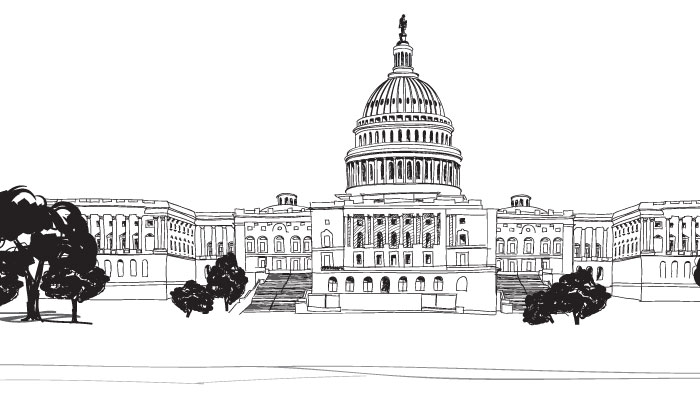Government Affairs Committee reports on hot issues
Lawmakers and government agencies are pursuing numerous initiatives that could have serious consequences for fuel marketers, and New England Fuel Institute (NEFI) is working to influence legislative and regulatory developments to protect industry interests.
NEFI’s Government Affairs Committee recently reported to the Institute’s Board of Directors regarding pending issues. “It has been a very active few months for NEFI and the industry on the legislative and regulatory fronts,” wrote Committee Chairman David Foster. “While you were busy keeping your customers safe and warm this winter, the team at NEFI—Michael Trunzo, Jim Collura and Mark Morgan—remained hard at work looking out for your interests in Washington and the New England region.”
The new Republican-controlled Congress is advancing a legislative agenda that was stymied in the previously Democrat-led Senate, according to Foster. “They began with energy legislation, including bills to approve the Keystone XL, expedite natural gas pipeline permits and exports, he wrote. “In the coming months, Congress is expected to debate other issues of interest, including changes to commodity trading regulations and the Obamacare employer mandate, and increases to gasoline and diesel fuel excise taxes.”
The Committee report identified several developing areas of policy and regulation and explained NEFI’s positions and plans to intervene.
Proposal to Increase Motor Carrier Financial Responsibility
The U.S. Department of Transportation (DOT) has announced it will issue a proposed rule that would increase the amount of minimum financial responsibility required for commercial motor vehicles hauling HAZMAT and non-HAZMAT shipments. “The rule is important for NEFI members because it could lead to thousands of dollars in additional annual costs to maintain sufficient financial responsibility in order to haul petroleum products,” the GAC wrote. “Currently, federal regulations require heating oil dealers to maintain $1 million in financial responsibility on all commercial motor vehicles hauling HAZMAT. While most heating oil dealers generally carry more than the minimum FR levels, the FMCSA is contemplating an increase as high as $10 million.”
In written comments, NEFI argued against the proposal saying the Federal Motor Carrier Safety Administration (FMCSA) cannot justify an increase in insurance rates. Less than 1 percent of accidents involving commercial trucks resulted in liability exceeding the carrier’s insurance coverage. When fault is factored in, only 22 accidents out of 330,000 involved motor carriers who did not have sufficient financial responsibility to cover liability. In addition, NEFI referenced a recent study by the American Trucking Associations (ATA) that found that there is only a 1.4 percent chance of a claim exceeding $500,000, a 0.73 percent chance of a claim going over $1,000,000 and a 0.31 percent chance of a claim topping $2 million.
“NEFI said it is clear from existing data that the occurrence of financial responsibility shortfalls involving motor carrier accidents is exceedingly rare,” the GAC reported. “NEFI also told the FMCSA most heating oil dealers carry more than the minimum $5 million, that the private insurance market is regulating coverage appropriately and increased coverage will invite more lawsuits for damages by unscrupulous plaintiff attorneys. Finally, NEFI said that the proposed insurance hike would deal a devastating blow to small business heating oil dealers, many who run seasonal businesses with narrow margins. NEFI concluded that the FMCSA cannot justify an increase in minimum financial responsibility requirements based on existing data and its own report.”
Proposal to Use LIHEAP Funds to Subsidize Fuel Switching
The President’s 2016 fiscal budget contains a line item that would provide the U.S. Department of Health and Human Services’ Low Income Home Energy Assistance Program (LIHEAP) with $200 million for a variety of purposes including “fuel switching” grants for LIHEAP customers. “While the President’s budget is dead on arrival in Congress, NEFI is concerned over the fuel switching provision nonetheless as it is the first time it has appeared as a policy issue,” the Committee wrote. “The fuel switching provision is not very specific other than to say that funds would be made available for those who wish to switch from heating oil or propane to natural gas. NEFI has arranged a meeting with HHS LIHEAP to talk about the inaccurate assumptions concerning cost and energy savings fuel switching would provide.”
NEFI will provide statistics and reports that prove these assumptions are wrong and argue that these LIHEAP funds are better spent on weatherization, which will provide far more value in terms of cost and energy savings than fuel switching, the committee wrote. “NEFI’s goal is to tamp down the issue of fuel switching now before it begins to gain traction at HHS as a viable option.”
Methane Leaks From Natural Gas Infrastructure
The U.S. Environmental Protection Agency (EPA) recently announced it is set to impose strict new requirements to control methane leaks seeping from natural gas drilling sites and processing facilities nationwide. The standards, which will be proposed by the EPA this summer, are one piece of a larger effort the administration says will help to achieve its new goal to slash methane emissions from the oil and gas sector by 45 percent over the next 10 years.
“Historically, natural gas fracking operations have largely operated free of federal environmental regulation. However, the EPA methane emission control requirements would impose costly new regulatory burdens on the natural gas industry for the first time,” the committee wrote in its report. “The EPA plan would include tougher emission control requirements for new and modified natural gas wells and facilities and would tighten regulations for companies operating on public lands.”
The committee noted weaknesses in the regulations: There are no proposed regulations on existing wells and processing facilities or for natural gas pipelines and compressing stations, which are significant sources of fugitive methane emissions.
Natural gas producers oppose the EPA plan, arguing that methane emissions are already falling due to voluntary practices, and tighter standards could undercut U.S. competitiveness and reduce natural gas supplies. NEFI plans to submit written comments supporting the proposed rule.
Reducing Lead Paint Containment Training for Contractors
The EPA is looking to ease the training requirements for contractors, including heating oil dealers involved with HVAC repairs and replacements in homes containing lead-based paint. Home repair contractors seeking recertification would no longer be required to go through more intensive hands-on training to learn how to safely test for, remove, dispose of, and clean up after lead-based paint. Under the proposed rules, contractors would still be required to take an online refresher course to renew their licenses after five years, but they would no longer be required to go through a second round of hands-on training. The EPA estimates the changes would save industry nearly $10 million per year but have only a minimal effect on health and safety. NEFI plans to submit written comments to the EPA supporting the proposed changes.
LIHEAP Administration
NEFI is concerned that increasingly onerous administrative burdens imposed by state and local LIHEAP agencies will force many heating oil dealers to drop out of LIHEAP. NEFI is seeking more efficient, streamlined and uniform data collection and payment standards to ease the regulatory burden on oil heat dealers. NEFI has scheduled a meeting with federal LIHEAP administrators to follow up on issues discussed in a similar meeting with the LIHEAP regional administrator in Boston earlier this year. NEFI has commitments from four heating oil dealers to attend the meeting in Washington, D.C. so they can relate their frustrations firsthand to LIHEAP administrators. Both the regional and federal LIHEAP offices are committed to working with NEFI to solve program inefficiencies, the committee reports. NEFI is working with State Association Executives and the LIHEAP task force to develop a consensus strategy moving forward.
Enforcement Issues
NEFI is also monitoring several enforcement issues. The Institute has learned that the U.S. Occupational Safety and Health Administration (OSHA) is handing out violation notices for failure to provide fall protection to drivers loading from bulk plant loading racks. OSHA requires loading arms to either have a protective railing to prevent falls or break away harness for drivers when top loading trucks with product. NEFI was able to stop similar enforcement in Massachusetts back in 2004 arguing that it is more dangerous to tether a driver to a loading rack in the event of a release or fire and that data does not suggest that drivers are falling from loading racks. NEFI is continuing to monitor OSHA enforcement in this area and will assist state association executives with state OSHA administrators on an as-needed basis.
NEFI has also learned that EPA Region I is enforcing SPCC requirements for parked trucks in the New England states. NEFI has heard reports from Vermont that Regional Inspectors are telling heating oil dealers that parked trucks containing product must be parked within dykes or catchment berms. This is incorrect information. NEFI won a regulatory change in this requirement back in 2007. Parked trucks containing product need only have drip pans sufficient to contain the most likely release from a valve or hose. NEFI met with federal EPA SPCC administrators in Washington D.C. to discuss erroneous enforcement of the parked truck requirement.





